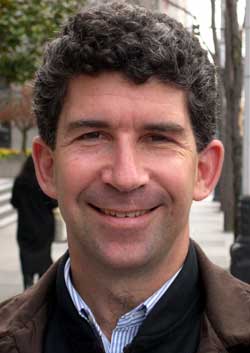If Dickens had scripted it, this monorail party was the best of times, the worst of times. Seattle Monorail Project directors filed into their meeting room off Fourth Avenue mostly smiling, in a jocular mood, on Wednesday, April 6. Two kids played with the house PA system—”Whoa! Cool!” booming across the room—as SMP Executive Director Joel Horn joked a bit and showed off the blown-up picture he took of a Japanese monorail. “Sometimes,” said board chair Tom Weeks, “we need to really acknowledge the joy of milestones along the way.” Along with the frivolity, mystery hung in the air. The media had been called in. Thirty months after the monorail was approved, with no earth turned, something was finally up. Would SMP announce an agreement with its prospective builder? Or would it say it was ending 233 days of negotiation and putting the $1.69 billion project back out for bids?
Neither, it turned out. The milestone, Horn told the board that night, was that SMP had “made progress” with its sole bidder. And maybe they’d make even more. Cascadia Monorail, a 29-company consortium led by Washington Group International, Fluor, and Hitachi, had submitted a final, revised proposal, along with a $25 million good-faith deposit. The offer “shows the seriousness of their proposal,” Horn said. “In short, we have taken a major step forward.” Now, on to day 234, and still counting.
The party balloons thus were not released. SMP had been under growing pressure to move forward, and, arguably, it was an inch-stone rather than a milestone. Still, board members hadn’t had a lot to celebrate in the past few years of financial and design surprises, so members took turns around the table offering congratulations. Horn’s “major step forward” turned “milestone” grew to “major milestone” and ultimately to “critical milestone.” Some board members had considered backing a do-or-die negotiations deadline. Now, it wasn’t needed, they agreed. They were advancing.
The party pooping isn’t finished, however. Even with the final—or, perhaps, semifinal—proposal in hand, it will be at least another couple months before a decision might be made. There are thousands of bid pages to read, line by line, sometimes word by word, before the offer can be recommended for acceptance by the board, Horn cautioned. A bid agreement could happen sooner, possibly in May. But June seemed more likely, several officials agreed. Actually, it could be up to 90 days, June or July, said Horn. Construction director Tom Horkan said 60 to 90 days was “our best estimate.” Board member Paul Toliver, noting the 13.7-mile monorail from Crown Hill to West Seattle was the biggest public works project ever proposed for Seattle, then granted an extension of sorts, to “July or August.”
Because, as Horn put it, SMP must remain “very, very sober” about contract talks and the taxpayers’ interests, any agreement also would be followed by more processes: public hearings, possibly new negotiations, more revisions, and a City Hall financial review among them. SMP would not be breaking ground until fall at best—a year behind the planned start. The monorail that was to open its first leg in 2007 now will almost certainly not make its 2009 launch deadline, either (see “Monorail By 2010?” Jan. 26).
Then came another sobering caveat. In May and/or June, SMP will be negotiating a final fixed price and construction schedule, said Horkan. The agency and Cascadia then would contractually hit the “setting date” in June or July, in which an agreement is struck. “That’s assuming we’re able to get to that point,” said Horkan. The room paused, sensing something floating in the punch bowl. “There is the possibility that we will not be able to reach that point,” he warned. Any agreement talks would thus have fallen short, and the next stage—rebidding or, say it isn’t so, another (fifth) public vote?—would kick in. But, Horkan added soothingly, past talks “bode well” that an agreement will be reached.
What ultimately emerged from the progress report was this: The bidder had made a proposed revised offer that will be reviewed. No one could say it would be accepted or that the project would in fact not be rebid. If the meeting was called to suggest there was light at the end of the tunnel, the light wasn’t coming from a monorail just yet. Nor would Horn or the others give a hint of what kind of monorail system the presumably winnowed-down (by $200 million) revised bid would produce: fewer rail miles, fewer cars, fewer bells and whistles than proposed? Will there, at least, be 19 stations, as voters were told? “That’s being negotiated,” said SMP spokesperson Natasha Jones, indicating 19 was no longer a hard number (there may be as few as 13; see “A $6 Billion Monorail?” March 2).
In the end, it was, as usual, board member Cindi Laws pulling down some of the decorations. She was happy to hear of the adjusted bid offer, she said. But what if it fails? SMP does not have a Plan B on the drawing board (and a rebid could add as much as another year, perhaps two, to the timeline). “Hope is not a method,” she said, harkening back to her days, she noted, when she worked on a human-reproduction project. “What happens if the condom breaks? What are we going to do? We have no backup plan. And there is no emergency contraception put in place right now. . . . We have invested so much of the public’s money, and we’ve certainly invested wisely in their trust, and I don’t want to violate that trust.” Her comments were followed by a symbolic discarding of pointy hats.








